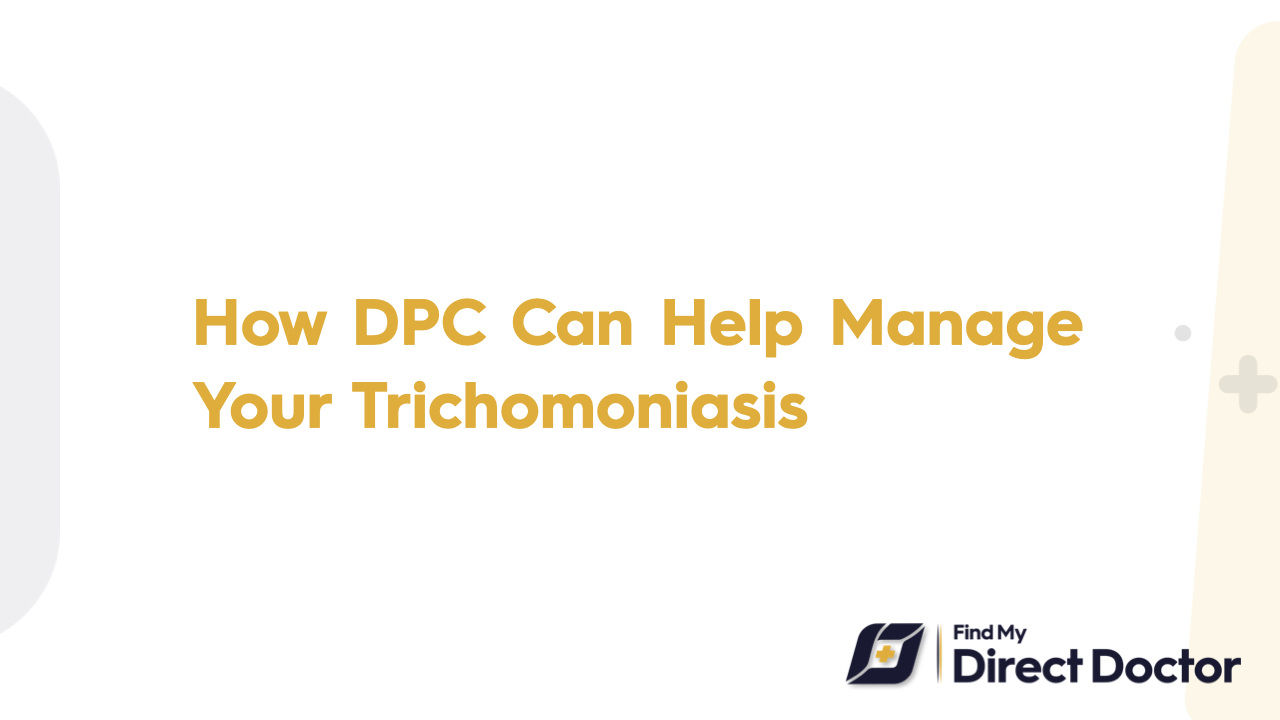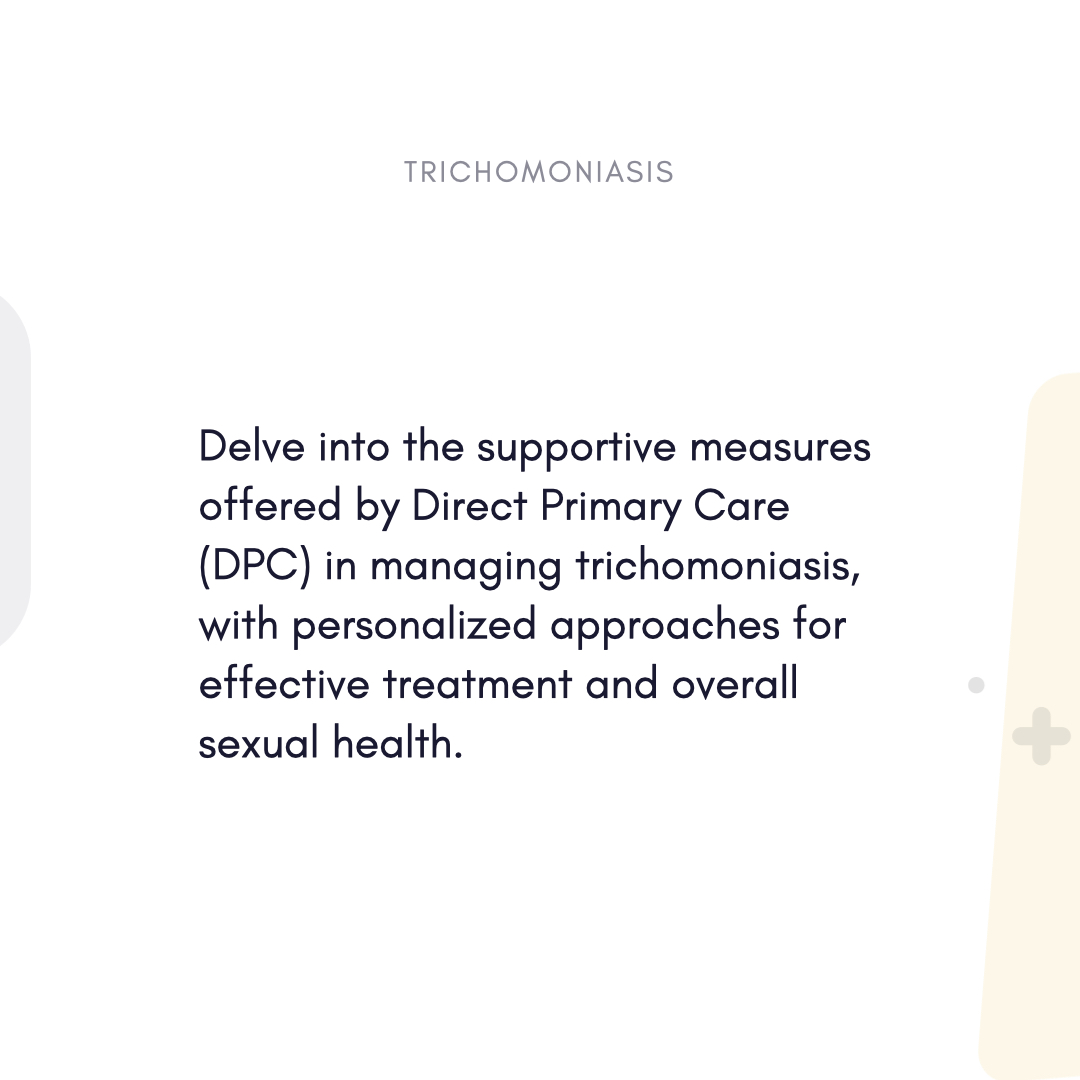Trichomoniasis and Direct Primary Care (DPC): Discreet, Affordable STI Care
If you have ever felt uncomfortable, discharged, or itching following unprotected sex, you know how urgently trichomonas needs to be treated. Though many go untreated because of stigma or cost, this common STI afflicts 3.7 million Americans yearly. Direct Primary Care (DPC), which combines quick testing, reasonably priced treatment, and techniques to prevent recurrence, presents a private, patient-first approach to trichomonas, however.

Dealing with Trichomonas and Its Effects
Trichomonas vaginalis is the parasite causing trichomonas; it spreads via sexual contact. Main symptoms:
- Women: dysuria; vulvar itching; frothy discharge.
- Men: Often asymptomatic, urethritis and penile irritation.
Complications include:
- Higher risk of HIV spread.
- PID in women, pelvic inflammatory disease.
- Preterm birth for expectant mothers.
DPC Changes Things Trichomonas Treatments
Under the membership concept known as Direct Primary Care (DPC), patients pay a monthly fee—usually between 50 USD and 150 USD—for unlimited access to their primary care physician. For those with trichomonas, this translates into no surprise bills, no waiting days for visits, and treatment emphasizing quick recovery and privacy.
Here's why DPC distinguishes itself:
1. Timely, free of judgment testing
DPC doctors follow CDC recommendations including:
- More exact than wet mounts: same-day NAAT testing.
- Prescribing partner meds without an exam in accelerated partner therapy (EPT).
- Coordinating HIV/STIs means bundled testing for syphilis, chlamydia, etc.
2. Reasonably priced, efficient therapy
- DPC clinics cut expenses by: providing metronidazole or tinidazole at wholesale rates (10 USD rather than 50 USD+).
- Offering free dental dams and condoms to stop reinfection.
- Avoiding ER mark-ups for symptom checks using 24/7 telehealth.
3. Ongoing Preventive Support
Patients with continuous DPC access can:
- Access PrEP for HIV prevention following a diagnosis.
- Get quarterly STIs for those at great risk.
- See a confidential counselor to learn safer sex techniques.
DPC Benefits for Trichomonas Patients: Individualized Care Plans
- Each visit, DPC doctors spend 30 to 60 minutes developing plans including:
- Dose changes: Extended metronidazole courses for cases of resistance.
- Partner alert: Help with anonymous contact tracing.
- Pregnancy care: Safe treatment plans meant to stop preterm delivery.
Savings in Costs
- For urgent STIs, there are no co-pays.
- STIs in clinics at 300 USD+ vs 100 USD.
- Early treatment helps to avoid complications including PID.
DPC's holistic sexual health covers:
- Mental wellness: therapy for STI-related anxiety.
- Contraception: IUDs or implants meant to lower future risk.
- Education: Dispelling trichomonas transmission myths.
Personal Success Stories from Real Life
- Case 1: Avoiding PID, 24-year-old Sarah cleared trichomonas using DPC's same-day testing and metronidazole in a week.
- Case 2: Using DPC's EPT to treat his asymptomatic infection, James, 30, saved his relationship.
FAQ: DPC and Trichomonas
- Q: Can trichomonas disappear on its own?
- A: Not, yes. Left untreated, it lasts for years. DPC guarantees quick and efficient treatment.
- Q: For uninsured patients, is DPC reasonably priced?
- A: Sure. Comparatively to urgent clinics, members save 50–70% on STI treatment.
- Q: Should a specialist be needed, what then?
- A: DPC works at cash rates with OB-GYNs/urologists for difficult cases.
Why DPC Is a Win for Trichomonas Patients: Why
To help to stop the spread of STIs, the CDC stresses EPT and regular screening. DPC provides this by:
- Stressing stigma: Confidential treatment free of insurance documentation.
- Educating patients on partner care and preventative measures empowers them.
- Cost simplification: One monthly charge covers follow-up, therapy, and testing.
Using DPC, Reclaim Your Sexual Health
Trichomonas does not have to linger silently. Every test, every medication, every step toward confidence—you get a partner that values your privacy, your health, and your peace of mind with DPC.






